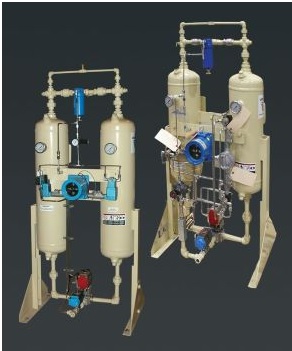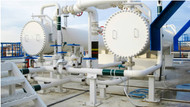Natural Gas Dehydration Units: Processes, Technolo…
Posted by AVP on Mar 22nd 2023
Natural gas can generate power, heat homes, and so on. Yet, the water vapor in natural gas can lower its energy content, damage equipment, and increase the likelihood of pipeline blockages.
To prevent these issues, natural gas must be dehydrated before it is transported, processed, or used.
In this article, we will explore the importance of natural gas dehydration, the different processes and technologies used in natural gas dehydration units, and the benefits of using natural gas regenerative dryers.
Why Dehydrate Natural Gas?
The presence of water vapor in natural gas can have several negative effects.
- To start, corrosion from water vapor in pipes and machinery can cause leaks, breakdowns, and even accidents.
- Second, water vapor can decrease natural gas's energy content, lowering its value and raising the volume needed to meet energy demands.
- Third, water vapor can cause blockages in pipelines and equipment, which can reduce the flow rate, increase pressure drops, and affect the efficiency of natural gas processing and transportation.
- Fourth, water vapor can freeze and form hydrates, which can clog pipelines, valves, and filters, and cause operational problems.
To prevent these issues, natural gas must be dehydrated to remove water vapor and other impurities. Water is removed from natural gas using a dehydration process so that it can be safely transported, processed, and used.
Water is removed from natural gas using a dehydration process so that it can be safely transported, processed, and used.
Natural gas can be dehydrated using a number of processes, including adsorption, and adsorption.
Processes and Technologies Used in Natural Gas Dehydration Units
Adsorption
Adsorption is a method for purifying natural gas by removing water vapor from it through adsorption onto a solid surface, often a molecular sieve. For dehydrating natural gas, adsorption is frequently used due to its efficiency, low energy consumption, and low cost.
Adsorption units typically consist of one or more vessels filled with a desiccant material, such as activated alumina, silica gel, or zeolite.
Absorption
With a Deliquescent Dryer, the water vapor in natural gas can be absorbed and removed.
By passing natural gas through the tower, water vapor may be removed from the gas. After the Deliquescent Tablets have absorbed all of the water vapor, the saturated tablets dissolve and this brine solution can be drained off the vessel.

Natural Gas Regenerative Dryers
Van Air Systems' HLSXG regenerative desiccant natural gas dryers provide an optimal solution for operators who require exceptionally dry gas in the most challenging and inhospitable operating environments.
These dryers are engineered to function in areas classified as hazardous, specifically Class 1 Division 1, Groups C & D, as per the National Electric Code. Consequently, these dryers are an ideal choice for use in the natural gas industry where safety and performance are paramount.
The HLSXG dryers are designed with explosion-proof features that eliminate the possibility of spark generation and potential explosions.
In situations where combustible gasses may be present, it is critical that all equipment is designed to guarantee safety and remove the risk of explosions. The HLSXG dryers meet these requirements with all electrical enclosures and components tested and designed to operate in such conditions.
The HLSXG dryers employ pressure swing adsorption to extract water vapor from saturated gas. During this process, the gas passes through a bed of desiccant material, selectively adsorbing water vapor molecules.
The desiccant material then goes through a regeneration cycle, removing the adsorbed water vapor molecules and restoring its adsorption capacity. The outcome is exceptionally dry gas that meets the stringent demands of various natural gas applications.
Benefits of Natural Gas Dehydration
Natural gas dehydration plays a vital role in the natural gas industry, offering a multitude of benefits that cannot be ignored.
Improved Safety
One of the most significant advantages of dehydrated natural gas is enhanced safety. Since dehydrated natural gas is less likely to cause corrosion, blockages, or hydrate formation, it reduces the probability of operational problems and safety hazards.
As a result, dehydrated natural gas is more reliable and safer to transport.
Increased Efficiency
Another benefit of natural gas dehydration is increased efficiency. Dehydrated natural gas has a higher energy content and a lower volume, which translates to reduced transportation costs and increased natural gas value.
Reduced Maintenance Costs
Reduced maintenance costs are another advantage of natural gas dehydration. Dehydrated natural gas is less prone to causing corrosion, blockages, or hydrate formation, which decreases the need for maintenance or repair.
Furthermore, dehydration can prolong the lifespan of equipment, lowering capital costs and increasing the return on investment.
Overall, natural gas dehydration is a critical process that ensures the safety, efficiency, and reliability of natural gas processing and transportation. The numerous benefits it offers make it an essential aspect of the natural gas industry.
To learn more about natural gas dehydration, contact us today at 866.660.0208
